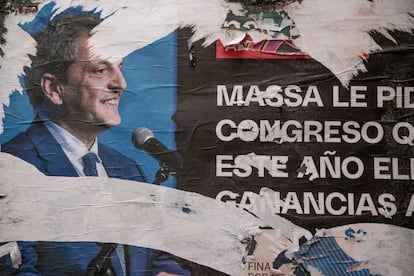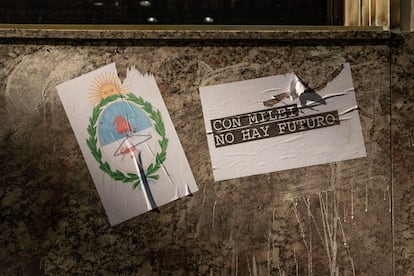Argentina’s presidential campaign enters the muck of electoral fraud allegations
The contest’s home stretch has been tainted by fake news, as far-right candidate Javier Milei’s party questions the electoral system, though it has not filed a formal complaint

Argentina will vote on November 19 in the second round of elections in which the rejection vote will loom large. Peronist Sergio Massa, who received 36% of the votes in the first round, and far-right candidate Javier Milei, who came in second with 29%, aspire to win the presidency after an election that lasted almost half a year, began with 27 candidates in the August primaries, and will now be determined by over 9.5 million voters (35% of the electoral roll) who did not vote for either of them in the first-round elections on October 22. Competition to win that vote has been fierce in the past few weeks: Massa has highlighted Milei’s platform, noting that he has even proposed that health and education cease to be public altogether, while the far-right candidate has cemented a pact with former President Mauricio Macri to ally the right wing against Peronism. While the campaigns continue to play political chess, fake news has been cannon fodder in an election that has featured short videos designed for social media. The most common refrain among Milei’s supporters is unprecedented in 40 years of Argentine democracy: the possibility of electoral fraud.
On Milei’s tour of the northern suburbs of Buenos Aires a week ago, all of those interviewed by EL PAÍS were convinced that fraud had taken place in the October general elections. Some people gave the examples of the viral images of telegrams [announcing the provisional vote count] containing errors that hurt La Libertad Avanza [Milei’s party] and polling stations where the far-right party had received zero votes. Others appealed to what they considered to be common sense. “In Lomas de Zamora, amid the scandal of [former Buenos Aires Chief of Staff Martín] Insaurralde’s yacht, do you think that Peronism could have won without cheating? There was fraud,” said Antonia, a retired woman who described herself as “anti-Peronist and anti-corruption.”
Chequeado, an organization dedicated to verifying sources and information, points out that “the official data from the provisional vote count shows that these inconsistencies affected five presidential candidates and that they affected a very low percentage of polling stations.” The telegrams are used for the provisional vote count; while they are informative, they are not legally valid. “Errors in the telegrams can be corrected in the final tally,” they add. There was minimal difference between the provisional and final data and the nearly seven-point gap between Massa and Milei remained.

“We are concerned about disinformation in general, but we are especially concerned about disinformation linked to fraud because it has the potential to cause an enormous level of damage that we have not seen until now,” says Olivia Sohr, the director of Impact and New Initiatives at Chequeado. Sohr explains that fake news is not naïve; rather it is thought out and therefore especially effective when it appeals to emotions and confirms the beliefs of those who receive it. In this sense, voters firmly in Massa’s camp are willing to believe distorted information about Milei and vice versa.
Jair Bolsonaro in Brazil and Donald Trump in the United States both employed the strategy of alleging fraud to ignore unfavorable electoral results. Now, Milei seems to be headed in the same direction. In a very close contest, in which polls give him a slight advantage over Massa, the Argentine economist has declared that the October elections were not clean. “There were irregularities of such a size that put the result in doubt,” he said in an interview with Peruvian writer Jaime Bayly. Despite the serious public accusation, however, La Libertad Avanza’s team has not filed a formal complaint with the Argentine electoral authorities.
Doubts about the election, as well as other fake news, proliferate on social media, such as TikTok, YouTube and X (formerly Twitter), where almost a third of Argentine voters under 29 years old get their news.
If in 2015 Mauricio Macri became “the president of Facebook” for shoring up his presidential victory with his presence on that social network, today Milei is the social media candidate, especially on audiovisual platforms. “Around the world, parties linked to the right have a special place on social media. That is the case of La Libertad Avanza and its leader, Javier Milei, in Argentina,” Ana Slimovich, a PhD in Social Sciences and researcher at the National Council of Scientific and Technical Research, noted in a conversation with this newspaper about Milei’s impact on the new social media. According to the researcher, the politician’s impact stems from the fact that his supporters “build discourses with a simple, untechnical language that appeals to both positive and negative emotions.”

But Milei’s social media presence goes well beyond the candidate himself. His party claims that “90% of the content is produced ad honorem.” La Libertad Avanza has about fifteen people working on the campaign’s digital strategy, almost six times less than the Peronist campaign, and it depends on many videos and tweets that independent activists post themselves. YouTube is the best example: Milei’s official account has just under 300,000 followers, but independent supporters who cut their videos to broadcast them, such as the account @elpelucamilei, have over 1 million followers.
In particular, Milei’s unofficial spokespersons are legion on X (formerly Twitter), where the week’s topic of debate has been a video doctored to show Sergio Massa taking cocaine. The original video of a man getting high in front of the camera has been circulating on the internet since at least 2016, but the version that was edited to include Massa’s face and voice has racked up 3 million views on Facebook, X and TikTok in the past few days. The video has been analyzed and debunked, but Milei’s supporters, who reach hundreds of thousands of X users, are still trying to sell the idea that Massa is a cocaine addict who is incapable of governing.
It is part of the muck of a close election. Since last October 23, the day after the first round of the elections, there have been 22 polls published that indicate that the election will be tight, whoever the winner is. Milei wins in 15 of them, but the results vary from a Milei victory by just two tenths of a point to a Massa victory by seven points. The Centro Estratégico Latinoamericano de Geopolítica (CELAG; Latin American Geopolitical Strategy Center) poll, published on November 10, gives some clues as to where the election will be decided: those interviewed agree that politicians are the social actors they most distrust, but most say that a traditional politician like Massa, who has been working in government for over 20 years, is more prepared to govern, has a greater capacity for dialogue than Milei and is “closer to the common people.” On the other hand, Milei is perceived as more capable of handling the economic crisis, but he is also the candidate who most scares those polled because of his instability and his proposals for cuts in healthcare, education, pensions and social benefits.
Sign up for our weekly newsletter to get more English-language news coverage from EL PAÍS USA Edition
Tu suscripción se está usando en otro dispositivo
¿Quieres añadir otro usuario a tu suscripción?
Si continúas leyendo en este dispositivo, no se podrá leer en el otro.
FlechaTu suscripción se está usando en otro dispositivo y solo puedes acceder a EL PAÍS desde un dispositivo a la vez.
Si quieres compartir tu cuenta, cambia tu suscripción a la modalidad Premium, así podrás añadir otro usuario. Cada uno accederá con su propia cuenta de email, lo que os permitirá personalizar vuestra experiencia en EL PAÍS.
¿Tienes una suscripción de empresa? Accede aquí para contratar más cuentas.
En el caso de no saber quién está usando tu cuenta, te recomendamos cambiar tu contraseña aquí.
Si decides continuar compartiendo tu cuenta, este mensaje se mostrará en tu dispositivo y en el de la otra persona que está usando tu cuenta de forma indefinida, afectando a tu experiencia de lectura. Puedes consultar aquí los términos y condiciones de la suscripción digital.








































